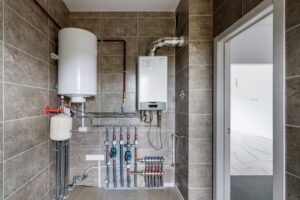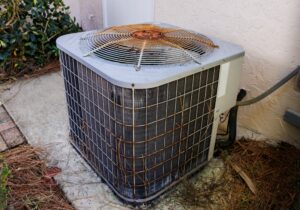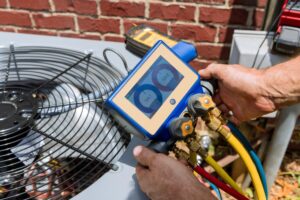As boilers age and experience extended use, they may begin to emit unusual noises that can leave homeowners puzzled and concerned. While some noises may indicate minor issues, others could point to more significant problems like kettling, air trapped in the system, or even failing components. Ignoring boiler noises, no matter how seemingly minor, is never a good idea, as small problems can escalate into costly repairs or even a full system breakdown.
Thankfully, the expert technicians at H.J. Faust understand how unsettling these boiler sounds can be and are here to help you decode what they mean, prevent them from occurring in the first place, and ensure your boiler runs safely and efficiently.
What Common Boiler Noises Mean
Your boiler’s noises can vary, as each sound typically points to a specific issue. Before you start panicking about the operation of your heating system, check out these common noises and what they might indicate:
Banging or Knocking Sounds
Banging noises are among the most alarming sounds a boiler can make and are often caused by kettling. Kettling occurs when limescale builds up on the heat exchanger and causes the water to overheat. This overheating creates steam bubbles that produce loud banging sounds. Another potential cause could be trapped air in the heating pipes, which disrupts water flow and leads to knocking sounds. You will need a professional technician to descale the system and ensure the thermostat is set to the proper temperature.
Hissing or Whistling
Hissing or whistling noises are typically caused by air in the system or high water pressure. Air bubbles can become trapped in your boiler or pipes. Alternatively, water could be forced through small openings, creating a whistle-like sound. A qualified HVAC technician can check for blockages or a malfunctioning pressure relief valve to resolve the issue of whistling or hissing noises.
Gurgling Noises
If your boiler gurgles, it often suggests there’s air trapped in the heating system, or the unit is affected by low water pressure. You may need to bleed your radiators to release trapped air. You can do this by using a radiator key to open the bleed valve until water starts flowing. If you’re unsure how to do this or need your boiler’s pressure gauge adjusted, contact a licensed HVAC technician for professional boiler services.
Humming or Vibrating
A low humming noise is usually not serious but could indicate minor issues such as a pump running at a high speed or loose components. Vibrations might occur if the boiler system isn’t securely mounted or if pipe brackets have loosened. Tighten any loose screws or brackets around the boiler or pipework. If the humming continues, a technician may need to adjust the pump’s settings or secure internal components.
Dripping Sounds
A dripping sound typically indicates a leak somewhere in the system, either from a pipe, valve, or internal boiler component. Inspect visible pipework for leaks or damp spots. If you suspect an internal issue, call a qualified technician.
Clicking
Hearing a clicking sound when your boiler starts up is generally normal and part of the ignition process. However, persistent or unusually loud clicking may indicate a faulty ignition system, such as a failing spark electrode or a gas supply issue. If the clicking continues or the boiler fails to ignite, seek help from a Gas Safe registered engineer to inspect the ignition components.
How to Prevent Strange Boiler Noises
Preventing unusual boiler sounds starts with proper maintenance and care. By staying proactive, you can protect your heating system from a range of problems and safety hazards. Follow these tips to keep your boiler in the best condition:
- Schedule Regular Maintenance: Annual inspections by professionals can identify and resolve potential issues before they become major problems. During a maintenance visit, a technician will clean and check critical components so your boiler operates smoothly.
- Flush Your System: Over time, debris, sludge, and limescale can build up inside your boiler, causing inefficiencies and noises. Power flushing your system removes these deposits and restores optimal water flow.
- Bleed Your Radiators: If you hear hissing or knocking noises, trapped air could be the culprit. Bleeding your radiators releases the air, allowing water to circulate freely and eliminating unwanted sounds.
- Insulate Pipes: In colder climates, condensate pipes are prone to freezing. Adding insulation can prevent freezing and loud noises.
- Monitor Water Pressure: Regularly check your boiler’s pressure gauge. Low or high pressure can cause noises and damage your system. Adjusting the pressure to the recommended range can prevent issues.
Resolve Annoying Boiler Noises With a Repair From H.J. Faust
While some homeowners may be tempted to troubleshoot and fix boiler noises themselves, most issues require the expertise of trained technicians. After all, boilers operate with gas, which can be hazardous when mishandled. Professionals are trained to work with gas and can keep your home safe. Plus, they can accurately identify the root cause of the strange sound and recommend the best solution so that you don’t have to invest in additional repairs and can have peace of mind about the longevity of your boiler system.
Are you ready to resolve those loud banging noises or irritating whistling sounds? Contact the experts at H.J. Faust. Since 1978, we have been Burlington, WI’s trusted provider of residential heating services. Our team stays up-to-date with the latest boiler technologies and repair techniques so that we can resolve an array of problems, from kettling to frozen pipes or failing components. Trust us to provide reliable, efficient solutions tailored to your needs.



